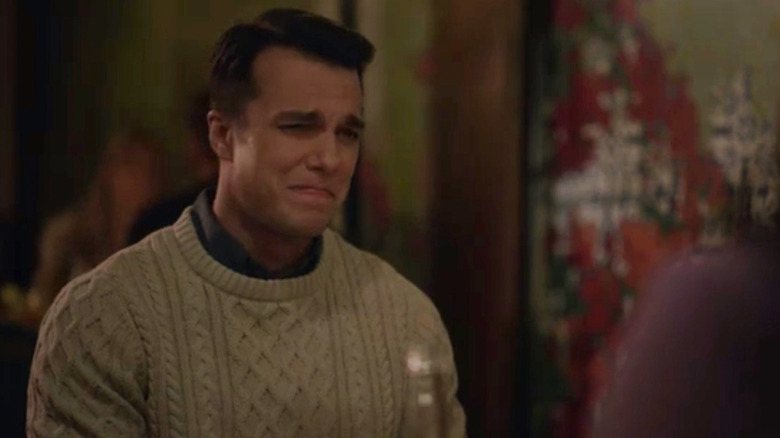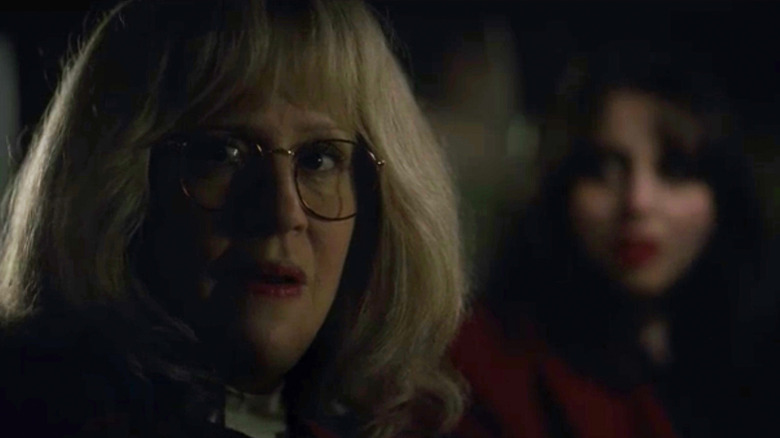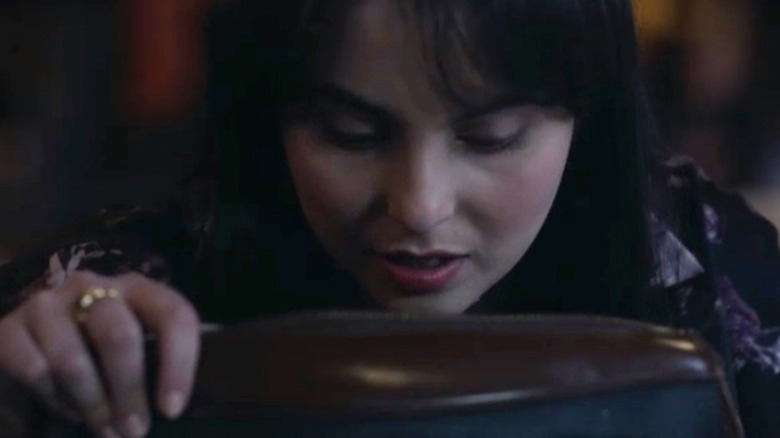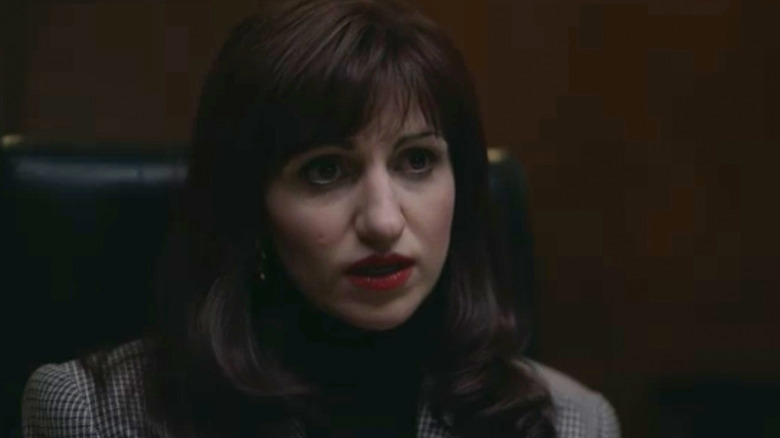How Accurate Is Impeachment: American Crime Story Episode 5?
"Impeachment" is the third overall season in Ryan Murphy's FX anthology series "American Crime," which dramatizes the events of the most notorious scandals in recent American memory. After the first two seasons recounted the O.J. Simpson murder trial and the killing of Gianni Versace, respectively, Season 3 focuses on President Bill Clinton's (Clive Owen) alleged pattern of sexual misconduct. It's told from the perspectives of former White House intern Monica Lewinsky (Beanie Feldstein) and her confidante and ultimate betrayer Linda Tripp (Sarah Paulson), while also following Paula Jones (Annaleigh Ashford) as she sues the president for sexual harassment.
In Episode 5, "Do You Hear What I Hear," which aired on October 5, 2021, Lewinsky and Tripp are both subpoenaed by Jones's legal team, which is a turning point in their friendship. When Tripp realizes that her recordings of conversations with Lewinsky were made illegally, she turns them over to the Office of the Independent Counsel, led by Kenneth Starr (Dan Bakkedahl), without Lewinsky's knowledge. Then, Tripp wears a wire to lunch with Lewinsky and helps Starr get evidence that both Lewinsky and Tripp have committed perjury. Meanwhile, Clinton's lawyer Bob Bennett (Christopher McDonald) deposes Jones and attempts to tarnish her reputation.
As with most shows based on a true story, some of the historical details are fudged. Here's what's fact and what's fiction in Episode 5.
Monica Lewinsky's date with Jake Tapper: partly accurate
The episode begins on a more lighthearted note. Monica Lewinsky is looking forward to leaving her Washington D.C. life behind for a fresh start in New York City. At a Tex-Mex restaurant, she bumps into none other than Jake Tapper (Chris Riggi), who would go on to become CNN's Lead Washington Anchor. Tapper asks Lewinsky to have dinner, she agrees. The two have a date but don't take it any further.
Lewinsky and Tapper did indeed go on one date in late 1997, just before Lewinsky's relationship with Clinton became public knowledge. Tapper wrote an op-ed about it for The Washington City Paper titled "I Dated Monica Lewinsky." But the show streamlines the events somewhat. In reality, Tapper and Lewinsky met at a going-away party for some mutual friends, where Tapper gave her his phone number, and the two later went out together.
One detail that the show did convey accurately was that Tapper's friend initially warned him not to ask Lewinsky out because of her rumored relationship with the president — indicating that Lewinsky and Clinton were already very much the subject of Washington D.C. gossip (via Slate).
But was Tapper actually wearing a cable-knit sweater on their date like he was on the show? That, unfortunately, remains a mystery.
Lewinsky and Tripp's reactions to being subpoenaed: accurate
Next, Linda Tripp and Monica Lewinsky are both subpoenaed to testify in the Paula Jones sexual harassment lawsuit, which threatens to expose Lewinsky's relationship with the president. Both women are alarmed and take steps to protect themselves. Lewinsky decides to sign an affidavit swearing that she and President Clinton didn't have a relationship. She asks Tripp to do the same, but Tripp refuses. This is when Lewinsky starts to realize that Tripp might not have her best interests at heart. Finally, when Lewinsky mentions that she's planning to get her stained blue dress drycleaned, Tripp talks her out of it, on the advice of literary agent Lucianne Goldberg (Margo Martindale).
According to Madeline Kaplan, researcher on the Slate podcast "Slow Burn," which covered the Clinton impeachment scandal, this is an accurate representation of how Lewinsky and Tripp reacted to the subpoenas. This was also the point when Lewsinky began to suspect that Tripp could possibly betray her confidence, not realizing that Tripp had already done just that.
Finally, the conversation about the blue dress really happened. Just like on the show, Tripp first tried to get Lewinsky to keep the stained dress to give her proof of her affair with Clinton in case she ever needed it. When that didn't convince Lewinsky, Tripp actually did tell her that the blue dress was unflattering and that she shouldn't wear it (via Vulture).
Tripp begins cooperating with the Starr team: accurate
Episode 5 shows how Linda Tripp began cooperating with Special Prosecutor Kenneth Starr, and how Tripp's recordings of her conversations with Monica Lewinsky came to light. After receiving her subpoena, Tripp takes the tapes to her lawyer for safekeeping. Her alarmed lawyer tells her that Tripp possibly committed a felony by recording Lewinsky without her knowledge (Tripp's home state of Maryland is a two-party consent state). Frantic, Tripp calls Goldberg, who advises her to turn the tapes over to Starr in exchange for immunity from prosecution.
This gives Starr and his team an opportunity to create a perjury trap for President Clinton, something they had failed to do after four years of investigating the Whitewater real-estate scandal. Four members of Starr's team go to Tripp's house for a late-night meeting and convince her to wear a wire to lunch with Lewinsky. The next day, Tripp gets Lewinsky to admit that she did in fact have a relationship with Clinton and that Vernon Jordan (Blair Underwood) got her a job to keep her quiet. Meanwhile, a paranoid Lewinsky goes through Tripp's handbag, looking for a recording device.
This all happened pretty much how the show suggested it did. In 1998, Goldberg told The New York Times that she did advise Tripp to cooperate with Starr (Goldberg was also the one who misled Tripp about consent-to-recording laws, which happened in Episode 4). The late-night meeting also really happened (via The LA Times). Finally, according to Kaplan, the depictions of the wiretapped lunch and Lewinsky's paranoia are accurate, including the moment with the handbag (via Vulture).
The Clinton legal team attacks Jones's personal life and reputation: partly accurate
In Little Rock, Arkansas, Paula Jones finally sits down for her deposition with President Clinton's legal team. Bob Bennett first asks Jones to confirm her earlier description of Clinton's penis, which she does — she says it "takes a U-turn." Then, Bennett attempts to tarnish Jones's reputation, blindsiding her with questions about her sexual history. Afterward, Jones is shaken by the experience, but her legal advisor Susan Carpenter-McMillan (Judith Light) vows to turn the tables on Clinton.
This sequence is only partially true. Bennett and his co-counsel really did ask Jones these exact questions about her personal life, but this is also when Jones famously produced the drawing of Clinton's genitals — "Impeachment" had this take place during Episode 1 when Jones met with her own lawyers. It's also inaccurate to suggest that Jones would have been surprised by these questions at the time of her deposition. The allegations about her personal life come from the deposition of Jones's former acquaintance, Dennis Kirkland. In reality, Jones was present for Kirkland's deposition, so she already knew what he alleged about her.
Additionally, according to Kaplan, the show omits the reason why Clinton's team is pursuing this strategy. At this point, Jones was also suing an Arkansas State Trooper for defamation of character after he suggested that Jones wanted to be then-Governor Clinton's girlfriend. Clinton's legal team responded to the lawsuit by attempting to prove that Jones had already defamed her own character by her own actions (via Vulture).
If you or anyone you know has been a victim of sexual assault, help is available. Visit the Rape, Abuse & Incest National Network website or contact RAINN's National Helpline at 1-800-656-HOPE (4673).




